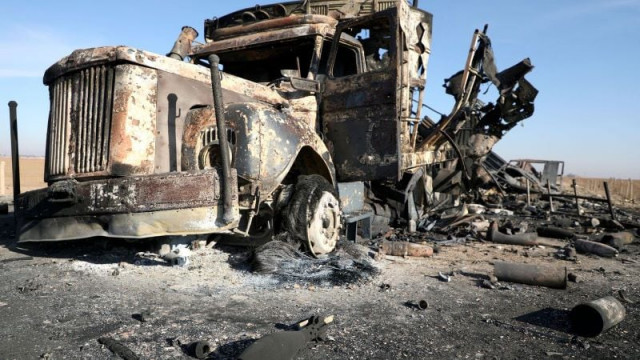Israeli strikes on Syria surpass 300 after Assad’s fall, IDF confirms troops in buffer zone
The IDF has said its strikes are aimed at preventing weapons from falling into the hands of extremists

Israeli warplanes have reportedly carried out more than 310 airstrikes across Syria since the fall of President Bashar al-Assad’s regime on Sunday, according to the Syrian Observatory for Human Rights (SOHR). The airstrikes have targeted several key locations across the country, including military facilities in Aleppo, Damascus, and Hama. The attacks, which have included more than 60 airstrikes overnight between Monday and Tuesday, have caused extensive damage to Syrian military assets, including weapon warehouses, ammunition depots, airports, naval bases, and research centres. Many of these facilities have been completely destroyed.
IDF Justifies strikes to prevent weapons from falling into extremists' hands
The Israel Defense Forces (IDF) have confirmed that their forces are operating in Syrian territory beyond the demilitarized buffer zone between Syria and the Israeli-occupied Golan Heights. The IDF has said its strikes are aimed at preventing weapons from falling into the hands of extremists, particularly as Syria enters a post-Assad era. Nadav Shoshani, an IDF spokesperson, told the BBC that the Israeli military had not approached Damascus as reports suggested but had deployed forces within the Area of Separation near the Golan Heights.
Syrian observers and local impact
Rami Abdul Rahman, founder of SOHR, condemned the strikes, describing the impact as "destroying all the capabilities of the Syrian army". He also stated that “Syrian lands are being violated”. Video evidence of the strikes, including a hit on a Syrian naval port in Latakia, has been verified by the BBC.
International reactions and the Golan Heights dispute
The ongoing Israeli operations have raised significant international concerns. Turkey’s Foreign Ministry has condemned Israel’s military action in the buffer zone, accusing the country of having an “occupying mentality” at a time when Syria is transitioning to a new regime. The Area of Separation was originally established in 1974 following a ceasefire agreement between Syria and Israel to prevent direct military confrontations. While Israel unilaterally annexed the Golan Heights in 1981, its sovereignty over the region remains unrecognized by most countries, although the US did so in 2019.
Israel’s strategic military aims in Syria
Israel has defended its airstrikes, with Israeli Foreign Minister Gideon Saar stating that Israel’s actions are focused on defending its citizens. He emphasized that Israel targets strategic weapon systems, such as chemical weapons and long-range missiles, to ensure they do not fall into the hands of extremist groups. The UN's chemical watchdog recently warned Syrian authorities to ensure suspected chemical weapons stockpiles are secure.
Syrian rebel victory and Assad’s ouster
The Israeli strikes come after Syrian rebel fighters, led by the Islamist opposition group Hayat Tahrir al-Sham (HTS), successfully captured Damascus and declared the fall of Bashar al-Assad’s regime. Assad and his father had ruled Syria for over 50 years. The rebels’ advance into the capital early on Sunday marked the end of Assad’s reign, which had been in power since 1971.



















COMMENTS
Comments are moderated and generally will be posted if they are on-topic and not abusive.
For more information, please see our Comments FAQ